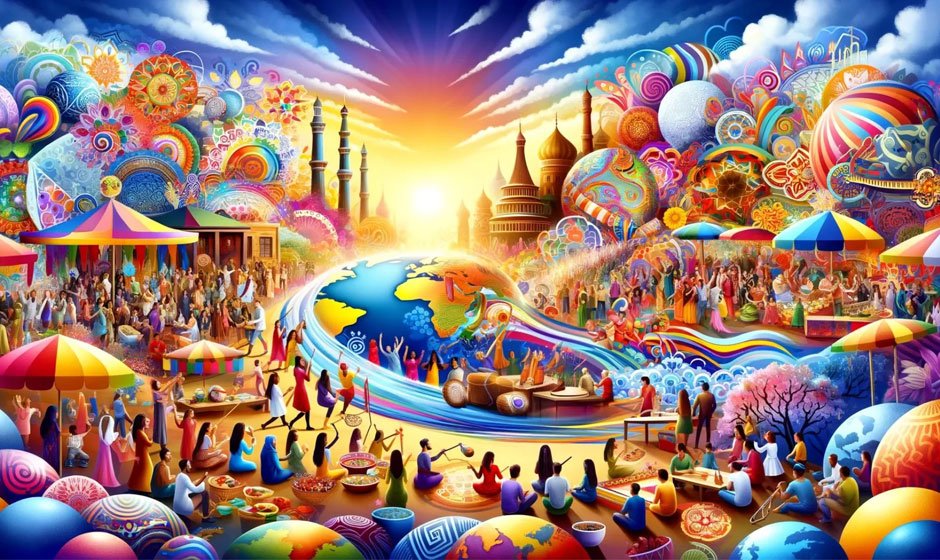Celebrating Unity Through Religious Festivals: A Journey of Hope and Togetherness

Around the world, festivals break the everyday routine, offering joy, time for reflection, and significant meaning. They’re more than just dates; they represent a common human desire to remember, think about, and connect with something more meaningful. Festivals enrich lives with tradition and meaning, allowing everyone to step back from regular life to enjoy and think deeply.
Importance of Religious Festivals
In all religions, festivals are significant. They remember important events and people, keeping faith communities strong. They teach important spiritual lessons and make memorable experiences. Festivals bring people together, creating a sense of unity and shared goals. They provide a pause in our busy lives to think about and confirm our beliefs, linking holy traditions with daily life and keeping religion active and meaningful.
Christian Celebrations
Easter
This major festival celebrates Jesus Christ’s resurrection, symbolizing hope and new beginnings. It’s not just about church services; there are fun traditions like Easter egg hunts, which represent new life and joy, and the Easter bunny, adding a playful touch.
Christmas
This is when Christians celebrate Jesus Christ’s birth. It’s known worldwide for family get-togethers, gift exchanges, and singing carols. Christmas is about more than religion; it’s about goodwill, sharing, and being together as a community.
Islamic Observances
Eid ul-Fitr
This is celebrated after Ramadan, a month of fasting and deep thought. It symbolizes cleaning the spirit and starting fresh. Families get together to eat and share, and giving to those in need is integral to the celebration.
Eid ul-Adha
This festival honors Prophet Abraham’s faith and willingness to sacrifice. It involves sharing meat with family, friends, and those who need it, showing caring and sharing.
Hindu Festivals
Diwali
Known as the Festival of Lights, Diwali marks Lord Rama’s return home. People light lamps in their homes, and families make and share sweets. There are also gift exchanges and fireworks, adding to the festival’s excitement and happiness.
Holi
This fun and colorful festival celebrates good winning over evil. It’s a time for happiness, forgiving, and bringing people together. Unique sweets like ‘gujiyas’ are part of the celebration, representing life’s sweetness.
Buddhist Celebrations
Vesak
This day remembers Buddha’s birth, enlightenment, and death. It’s a time for thinking, meditating, and being kind, following the Buddhist ideas of compassion and awareness. People often do good deeds, showing their selflessness and devotion.
Uposatha
These days happen several times monthly for spiritual cleansing and new beginnings. People meditate, follow the rules more closely, and listen to teachings, helping them better understand and practice their faith.
Jewish Festivals
Hanukkah
This eight-day festival of lights remembers a historic miracle. Lighting the menorah, playing games, and eating special foods are vital to the celebration. Hanukkah is about strength and faith, reflecting the Jewish people’s history and identity.
Passover
This festival remembers the Israelites’ freedom from Egypt. The Seder meal is critical, with foods that have special meanings telling the story of escape and freedom.
Common Elements in Festivals
Across all religions, festivals often have similar things that reflect what we all share as humans.
Feasts
Eating together is vital in most festivals, showing unity and life celebration. Every food and dish tells its own story and means something special.
Family Gatherings
Festivals are times for families to come together, letting different generations share stories and traditions keeping family ties strong.
Gift-giving
Giving gifts is common in many festivals, showing love and thanks, and often helping those in need, showing the importance of kindness in the community.
Local and Cultural Variations
Festivals change with local cultures, making a colorful mix of global and local customs. For instance, a Fort Worth church might add Texan elements to its Christmas celebrations, mixing Christian traditions with local ways. This happens worldwide, like in India, where Christmas might include local sweets, or Eid might have different foods in different countries. These differences show how festivals can change to fit other communities while keeping their spiritual meaning.
Symbols and Rituals
Festivals are full of symbols and rituals that tell profound spiritual truths. These practices help teach, inspire, and connect people to their faith.
The Role of Sacred Music
Music is a big part of festivals, helping express and connect feelings. From Christmas carols to Islamic Qawwalis, music adds to the spiritual sense and brings people together in devotion and celebration.
Nature and Festivities
Many festivals follow natural cycles, like the lunar calendar for Islamic festivals or seasonal changes for pagan celebrations. This shows the close connection between spiritual life and nature.
Interfaith Celebrations
In our connected world, people from different backgrounds often celebrate other traditions. This blending of traditions fosters understanding and respect, highlighting the beauty of cultural and religious diversity.
Global Impact of Festivals
In today’s interconnected world, religious festivals have a global impact, extending beyond their cultural origins. These celebrations bring diverse people together, fostering a sense of international community. For instance, non-Christians may participate in Christmas festivities, enjoying the universal themes of joy and giving. Similarly, events like Diwali and Eid are celebrated worldwide, promoting cultural exchange and understanding. Such global participation in religious festivals demonstrates how these occasions transcend geographical and cultural boundaries, promoting a message of unity and shared human values. They become platforms for cultural diplomacy, enhancing mutual respect and global harmony. This widespread celebration of diverse festivals is a testament to our growing worldwide interconnectedness and the universal appeal of these rich cultural and religious traditions.
Conclusion
From Holi’s excitement to Vesak’s calm reflection, religious festivals show themes of hope, gratitude, and community. They remind us of what we share as humans beyond cultural and religious differences. Understanding and respecting these celebrations can lead to a more caring and inclusive world.



